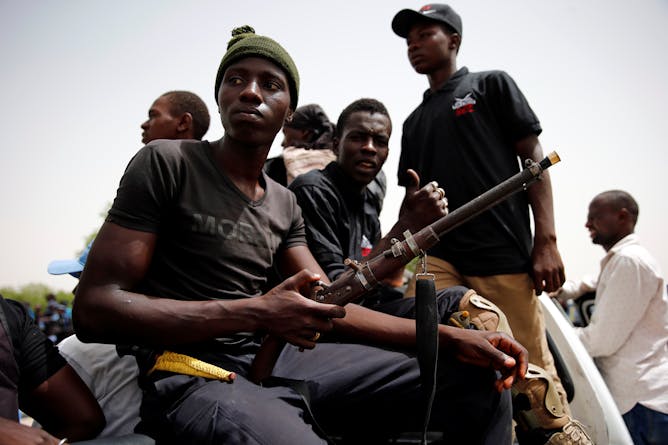|
Security in many communities in Nigeria is entrusted to machete-wielding, gun-toting civilian vigilantes. Members of these groups are often implicated in abuse, including extrajudicial killings. Leighann Spencer explains how many vigilante groups even have official support and why this is a problem.
More and more, doubt is being shed on the quality of scientific fields or sub-fields. Studies have shown that supposedly rigorous research outcomes can't be reproduced, which throws the results into question. This doubt, writes Andrea Saltelli, is being played out in the open. So can science fix itself, or does it need to unravel even more, before things start coming right?
South Africa’s President Jacob Zuma seems hell-bent on pursuing a controversial nuclear energy build programme despite stiff opposition from within and outside the African National Congress. Keith Gottschalk argues that Zuma’s determination shouldn’t be underestimated even though the plan is unworkable given the country’s prevailing economic fundamentals. And Hartmut Winkler explains why Zuma is insisting on an unfeasible plan.
|

Members of the Civilian Joint Task Force, a vigilante group battling Boko Haram in north east Nigeria.
Reuters/Akintunde Akinleye
Leighann Spencer, Charles Sturt University
Inefficient policing in Nigeria has forced many communities to rely on vigilante groups for security. Despite using force and violence, many groups even have support from authorities.
|
Science + Technology
|
-
Andrea Saltelli, University of Bergen
We are observing two new phenomena. On one hand doubt is shed on the quality of entire scientific fields or sub-fields. On the other this doubt is played out in the open, in the media and blogosphere.
|
|
Business + Economy
|
-
Keith Gottschalk, University of the Western Cape
South Africa's President Jacob Zuma seems to be making a final push to secure the nuclear power deal before his tenure comes to an end. But it won't be easy.
|
|
Environment + Energy
|
-
Hartmut Winkler, University of Johannesburg
South African President Jacob Zuma's efforts to promote his unpopular nuclear project are weakening him politically but he still seems keen to pursue it.
|
|
Health + Medicine
|
-
Stephen Ojiambo Wandera, Makerere University
Uganda's primary healthcare system needs to be strengthened to provide long term care for older people with chronic conditions.
|
|
From our international editions
|
-
Toni-Michelle C. Travis, George Mason University
In Virginia, suburbanites, city-dwellers and black voters together rebuffed racism as an electoral strategy and handed Dems a huge win. Is this diverse coalition the future of Old Dominion politics?
-
Marc-Antoine Fardin, Université Paris Diderot – USPC
Ig Nobels reward research that first makes you laugh and then makes you think. Investigating the internet meme of fluid felines fits the bill – and adds to the physics field of rheology.
-
John B Appleby, Lancaster University
Two experts check Lord Winston's claim.
-
Nick Perham, Cardiff Metropolitan University
Listening to your favourite album might not be the best idea if you've got something to do.
|
|